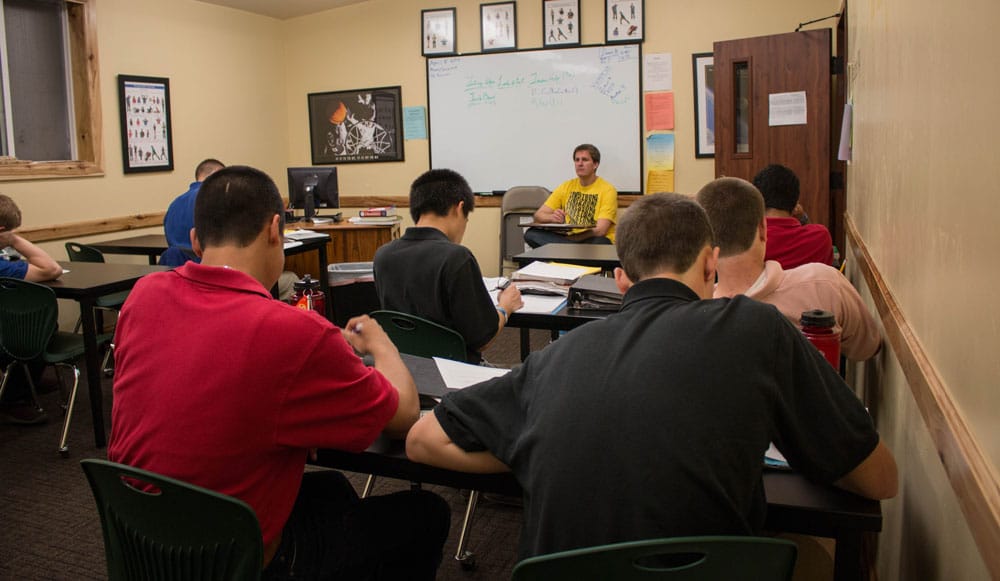As a parent, you’ve always seen the unique brilliance in your son, but watching him struggle with the challenges of Autism has been heart-wrenching. You want nothing more than to see him thrive, to find a place where he can be understood, supported, and empowered to reach his full potential. At Discovery Ranch, we understand your concerns and are here to help your son navigate his journey with resilience, compassion, and the skills he needs to build a brighter future. Together, we can help him rise above his challenges and embrace the incredible possibilities that lie ahead.

Seeking the right treatment for your son isn’t just about addressing the challenges of autism—it’s about unlocking his potential and providing him with the tailored support he needs to thrive. By choosing specialized teen autism treatment, you’re giving him access to individualized plans that focus on building social skills, managing anxiety, and enhancing executive functioning. Our program is dedicated to equipping him with the tools and insights that will empower him to succeed both now and in the future.
- Early Identification is Crucial: Recognizing the signs of autism in boys at an early stage is essential for providing timely and effective interventions. Early identification allows parents to seek the right support and resources, helping their son thrive despite the challenges of autism.
- Behavioral Challenges are Common: Teenage boys with autism often struggle with understanding social cues, leading to frustration and potential behavioral issues. These challenges can contribute to feelings of isolation, making it important to address them with empathy and appropriate strategies.
- Support and Structured Environment: A structured environment with clear expectations and consistent routines is crucial for helping boys with autism manage their day-to-day lives. This structure provides a sense of security and helps them develop important life skills.
- Importance of Tailored Interventions: Each boy with autism is unique, and a one-size-fits-all approach is not effective. Interventions should be customized to address his specific needs, strengths, and challenges, enabling him to reach his full potential.
- Parental Involvement is Key: Active involvement from parents in understanding and supporting their son's journey with autism is critical for his progress. Parents play a pivotal role in advocating for their child's needs and ensuring he receives the appropriate care and resources.
Get Your Teen the Help They Need. Our Admissions Team Offers a FREE and Confidential Consultation to Address Your Teen's Behavior Issues.
At Discovery Ranch, teenage boys with autism spectrum disorder receive individualized, specialized care that addresses their unique challenges while nurturing their strengths. Our program offers a supportive environment where your son can develop essential life skills, build meaningful relationships, and gain greater independence. By integrating therapeutic, academic, and experiential approaches, Discovery Ranch equips autistic teen boys with the tools they need to navigate the complexities of adolescence, fostering resilience, confidence, and preparation for the future.
Highlights of Discovery Ranch:
- Individualized Care: Each boy benefits from a tailored treatment plan focused on his specific needs, including social skills development, anxiety management, and executive functioning.
- Expert Staff: Our team includes highly skilled therapists with deep expertise in autism, ensuring that each boy receives the most effective and compassionate care.
- Experiential Learning: Engaging activities help boys apply social and life skills in real-world situations, promoting practical growth and self-reliance.
- Holistic Approach: We integrate behavioral, emotional, and social development to foster overall well-being.
- Safe Environment: A nurturing and structured setting promotes growth while providing a sense of security.
- Family Involvement: We prioritize family engagement, equipping parents with tools and strategies to support their son's progress at home.

Contact Discovery Ranch today to learn how our specialized autism treatment program can guide your teen towards a brighter, more fulfilling future.
Explore our table of contents to see how our unique approach addresses autism in teenage boys and provides the support your son needs.
Podcast: Beyond the Diagnosis Understanding and Supporting Teenage Boys with Autism
Feeling overwhelmed and unsure how to support your teenage son with autism? You're not alone. This podcast episode dives into the unique challenges parents face during this crucial developmental stage. Licensed clinical social worker Tiffany Herlin interviews Christopher Brown, a licensed marriage and family therapist specializing in working with teenagers with autism. Together, they unpack Autism Spectrum Disorder (ASD) and neurodiversity in teenage boys, offering insights and strategies to help your son thrive.

What is Autism in Teenage Boys
Autism Spectrum Disorder (ASD) is a neurodevelopmental disorder characterized by difficulties with social interactions, communication, repetitive behaviors, and sensory sensitivities, with varying levels of impact on daily functioning.
Autism in teenage boys presents unique challenges and opportunities as they navigate the transition from childhood to adolescence. This period can be particularly complex due to the heightened social and emotional demands of the teenage years. Boys with autism, who are considered neurodivergent—a term used to describe individuals whose brain development and functioning differ from the typical neurotypical pattern—may experience difficulties with social interactions, nonverbal communication, and forming relationships, which can be exacerbated during adolescence. Additionally, they might exhibit repetitive behaviors and intense interests and have heightened sensory sensitivities. Understanding and addressing autism in teenage boys requires a tailored approach that supports their individual needs while helping them build essential life skills and navigate the complexities of growing up.

Discover more about autism in teenagers
Understanding the prevalence and challenges associated with Autism Spectrum Disorder (ASD) in teenagers can empower parents to make informed decisions about their child's care. Here are some critical statistics:
- Anxiety and ASD: “Anxiety is commonplace among teenagers with ASD. We have about 39 percent of youth with ASD with a diagnosed anxiety disorder, making it a significant concern for this population.” (Herlin, Tiffany, Discovery Ranch Podcast: Parent's Guide: Understanding and Supporting Your Autistic Teenage Boy, Episode 1)
- Autism Prevalence: “A national survey of parents found an autism prevalence of 26.5 per 1,000 youth ages 12-17 years old.” (Shattuck, 2019)
- Gender Disparities: “ASD is 3.8 times as prevalent among boys (4.3%) as among girls (1.1%)” (National Institute of Mental Health, n.d.).
- Diagnosis and Early Intervention: Autism can be reliably diagnosed by a specialist by age 2, but the average age of autism diagnosis in the U.S. is 5 years (Autism Speaks, n.d.).
These statistics provide a foundation for understanding the complexities of autism in teenage boys, helping parents to navigate their child's unique needs better.
Supporting Teens with Level 1 and Level 2 ASD
Level 1 Autism Spectrum Disorder, previously known as High Functioning Autism or Asperger’s Syndrome, and Level 2 Autism Spectrum Disorder are two of the three severity levels within the autism spectrum. According to the DSM-5, three levels indicate varying degrees of support needed: Level 1 requires support, Level 2 requires substantial support, and Level 3 requires very substantial support.
At Discovery Ranch, we specialize in helping teen boys with both Level 1 and Level 2 Autism Spectrum Disorder. Individuals with Level 1 ASD may struggle with social communication and exhibit restrictive, repetitive behaviors that can significantly impact daily life. Although they can often speak in full sentences and engage in conversations, they may find social interactions challenging, such as making friends or responding to social cues in typical ways. Their behaviors may also be inflexible, making it difficult to transition between activities or organize tasks. On the other hand, boys with Level 2 ASD require even more substantial support, as their social communication challenges and repetitive behaviors are more pronounced.

Chronological Age vs Mental Age
When working with boys on the autism spectrum, it's important to recognize that their chronological age doesn't always align with their mental or emotional development. For boys with autism, particularly those at Levels 1 and 2, there can be a significant gap between how old they are and how they think and process the world around them. As highlighted by one of our therapists and Neurodiverse Specialists, Christopher Brown, LMFT, “They can be 18 years old, but if they're a level one, they're probably two-thirds of that age, so we're looking at a 12-year-old mentally. If it's a level two, we're looking at one-third, so probably six to seven years old mentally, as opposed to the chronological age, if they're 18.” (Brown, Christopher, Discovery Ranch Podcast: Parent's Guide: Understanding and Supporting Your Autistic Teenage Boy, Episode 1). Understanding the difference between a boy's chronological age and his mental age is crucial for providing the right level of support and intervention. At Discovery Ranch, we tailor our approach to meet each boy where he is developmentally, helping him grow and thrive in ways that are aligned with his individual needs.
Our experienced staff at Discovery Ranch is dedicated to understanding these unique challenges and providing the tailored support needed for your son to develop the social and organizational skills essential for greater independence and success.
Understanding Autism in Teenage Boys
Understanding autism in teenage boys requires more than just a surface-level awareness of the disorder. Autism Spectrum Disorder (ASD) manifests differently in each individual, but for teenage boys, the challenges can be particularly complex. As they navigate the already difficult period of adolescence, boys with autism may struggle with social communication, behavior regulation, and emotional development, making this period even more challenging. Recognizing these symptoms and understanding how autism uniquely affects teenage boys is crucial for providing the right support, helping them manage these challenges, and guiding them toward their full potential.

Recognizing Signs of Autism in Teenage Boys
When it comes to diagnosing autism in teenage boys, recognizing the signs can be challenging, especially if they have learned to mask or manage their symptoms in earlier years. As boys transition into adolescence, the demands of social interactions, school environments, and daily routines can become overwhelming, often revealing behaviors and challenges associated with Autism Spectrum Disorder (ASD). Understanding these symptoms is crucial for obtaining an accurate diagnosis and providing the appropriate support to help these boys navigate their teenage years successfully. Below are some of the key signs and symptoms of autism in teenage boys.
Common Signs of Autism in Teenage Boys
- Difficulty with Social Interaction: May struggle with conversation turn-taking, understanding social rules, and forming friendships. Prefers solitary activities or interacting with younger or older individuals.
- Communication Challenges: Often takes language literally, may speak in a monotone or with unusual volume, and has difficulty following multi-step instructions. Reduced eye contact and limited use of gestures are common.
- Behavioral Traits: Shows intense focus on specific interests, engages in repetitive behaviors like hand-flapping or lining up objects and can be distressed by changes in routines.
- Sensory Sensitivities: Sensitive to sensory stimuli such as loud noises or certain textures, may seek out or avoid sensory input, and may have a reduced response to pain.
- Emotional and Psychological Concerns: May experience anxiety, meltdowns, depression, and aggressive behavior. Also prone to sleep difficulties and school refusal.
- Executive Functioning Issues: Struggles with organizing tasks, managing time, and following routines, which can impact school performance and daily living.
Diagnostic criteria and processes
Diagnosing Autism Spectrum Disorder (ASD) requires evaluating both parental reports and professional observations, guided by the DSM-5 criteria.
To be diagnosed with ASD, the following criteria must be met:
1. Persistent deficits in social communication and interaction across multiple contexts, including:
- Challenges in social-emotional reciprocity.
- Difficulties with nonverbal communication.
- Problems developing and maintaining relationships.
2. Restricted, repetitive behaviors or interests, shown by at least two of the following:
- Repetitive movements or speech.
- Rigid adherence to routines.
- Intense, focused interests.
- Unusual sensory responses.
3. Symptoms must appear early in development, though they may become more evident as social demands increase.
4. Symptoms must cause significant impairment in social, occupational, or other important areas.
5. These symptoms must not be better explained by intellectual disability or global developmental delay, though these conditions can co-occur.
This framework ensures a thorough and accurate diagnosis of ASD.
Autism in teenagers is diagnosed when signs become more apparent during adolescence, often involving a comprehensive needs assessment and a diagnostic evaluation. The process includes observing interactions, interviewing the teen and parents, and reviewing developmental history. A multidisciplinary team uses DSM-5 criteria to confirm the diagnosis, which helps teens and their families understand their strengths and challenges, access appropriate support, and embrace their autistic identity.
Co-Occurring Conditions
Autism in teenage boys often coexists with other cognitive, emotional, or behavioral conditions. These co-occurring conditions can complicate diagnosis and treatment, making it crucial for parents and clinicians to recognize the full scope of a teen's challenges. Understanding these conditions is essential for developing an effective treatment plan.
Here are some common co-occurring conditions associated with autism in teenage boys:
- Anxiety Disorders: Many teenage boys with autism experience anxiety disorders, which can manifest as excessive worry, social anxiety, or obsessive-compulsive behaviors.
- Attention-Deficit/Hyperactivity Disorder (ADHD): ADHD is frequently diagnosed alongside autism, characterized by difficulties with focus, impulsivity, and hyperactivity, further impacting daily functioning.
- Depression: Depression is common in teenage boys with autism, often exacerbated by social isolation, communication difficulties, and the challenges of adolescence.
- Sensory Processing Disorder (SPD): Many teens with autism have SPD, leading to heightened or diminished sensitivity to sensory stimuli, affecting their daily activities and comfort.
- Obsessive-Compulsive Disorder (OCD): OCD can co-occur with autism, where teens may have repetitive thoughts and behaviors that they feel compelled to perform, which can interfere with their routines.
- Sleep Disorders: Sleep problems, including difficulty falling asleep and staying asleep, are prevalent in autistic teens, impacting their mood, behavior, and overall well-being.
- Learning Disabilities: Autism in teenage boys often coexists with learning disabilities, making it challenging for them to perform well in academic settings despite their intelligence and abilities.
- Seizure Disorders: Seizures, which can range from mild staring spells to full convulsions, are more common in autistic individuals, requiring careful monitoring and management.
Recognizing these co-occurring conditions is vital for creating a comprehensive and tailored treatment plan that addresses all aspects of a teenage boy’s health and development.
Differences Between Boys and Girls with Autism
When it comes to autism, boys and girls often exhibit different patterns of behavior and symptoms, which can affect how their autism is recognized and understood. Boys are diagnosed with Autism Spectrum Disorder (ASD) nearly four times more often than girls. This higher prevalence is partly due to boys displaying more overt and pronounced symptoms, such as intense and restrictive interests and repetitive behaviors, which align more closely with traditional diagnostic criteria. These characteristics can be more visible and less socially acceptable, making them easier to identify. However, despite this higher prevalence, boys don't always receive timely support. Early and accurate diagnosis is essential, as it allows for interventions that can significantly improve outcomes. Understanding these gender differences is crucial for ensuring boys receive the necessary support as early as possible, reducing the risks of co-occurring conditions like anxiety and depression.
Early Signs and When to Seek Professional Help
Recognizing early signs of autism is crucial for timely intervention. If you notice your child struggling with social interactions, communication, or displaying repetitive behaviors—especially as they transition into adolescence—it's important to seek professional help. Even if these signs were less obvious in earlier years, they may become more apparent and impactful as your child faces new social and academic challenges. Early diagnosis and support can make a significant difference in helping your child navigate these difficulties and develop to their full potential.
Navigating Adolescence: The Challenges Faced by Autistic Teenage Boys
Navigating adolescence can be particularly challenging for autistic teenage boys, as they face a unique set of hurdles that impact their daily lives and overall well-being. The transition from childhood to adulthood is marked by significant physical, emotional, and social changes, which can be even more complex for those with autism in teenage boys. They often encounter difficulties in forming and maintaining friendships, managing emotional fluctuations, and adapting to the demands of school. Additionally, they may struggle with executive functioning and mental health issues, including anxiety. Understanding these challenges is crucial for providing appropriate support and fostering an environment where autistic teenage boys can thrive and reach their full potential.

Autism in teenage boys poses challenges that can significantly impact their development and quality of life. As they navigate puberty and the transition into adulthood, these difficulties often become more pronounced.
- Physical changes: The onset of puberty can be particularly challenging for autistic boys, who may already have heightened sensory sensitivities and coordination issues. Rapid physical changes can lead to increased discomfort and confusion, making it harder for them to adapt to their bodies and the social expectations that come with adolescence.
- Emotional and social challenges and building friendships: Autistic boys often struggle with understanding social cues and managing the complexities of peer relationships. These difficulties can hinder their ability to form and maintain friendships, leading to feelings of isolation and frustration as they try to navigate the social landscape of adolescence.
- Behavioral and mental health challenges: Autism in teenage boys poses a higher risk of experiencing co-occurring mental health issues, such as anxiety and depression. Their behavioral responses, which may include meltdowns or withdrawal, can be misunderstood by others, further complicating their emotional well-being and increasing the need for supportive interventions.
- School challenges: In the academic setting, autistic boys often face difficulties with executive functioning, including organization, time management, and task completion. These challenges can affect their academic performance and overall experience in school, underscoring the importance of providing tailored support to help them succeed.
Addressing these challenges with empathy and appropriate interventions is crucial for helping autistic teenage boys navigate this critical stage of their lives.
Executive Functioning Support
Executive functioning encompasses a range of cognitive skills that help individuals manage tasks, regulate emotions, and make decisions. These skills include planning, organization, impulse control, and time management. For neurotypical teenagers, executive functioning continues to develop throughout adolescence. However, for teenage boys with autism, these skills can face additional challenges, especially during the tumultuous teenage years.
During adolescence, the demands on executive functioning intensify due to hormonal changes and increased social expectations. For boys with autism, this period often magnifies difficulties with executive functioning. The gap between their skills and those of their neurotypical peers can widen, leading to struggles with task management, goal setting, and future planning. Stress and anxiety frequently exacerbate these challenges. As the brain's stress response system is triggered, it can impair their ability to focus and complete tasks, leading to a cycle where increased anxiety further undermines executive functioning abilities.
Parental Support and Guidance
Raising a teenage boy with autism comes with its own set of challenges, but with the right strategies and support, you can make a significant difference in your son’s life. This section offers practical advice on how to communicate effectively with your son, foster his independence, and ensure you’re taking care of your own well-being as a parent. By applying these strategies, you can create a supportive environment that helps your son thrive and grow into a confident, capable young adult.

Effective Communication Strategies
One of the most important things parents can do is engage actively in their son's life. Instead of merely instructing him on what to do, consider a side-by-side approach. For example, rather than telling your son to walk the dog or wash the dishes, invite him to do these activities with you. This collaborative method can make tasks more manageable and less intimidating for your son, fostering a stronger connection between you both. By participating together, you’re not only helping him develop essential life skills but also showing that you’re there to support him every step of the way.
Effective communication is another cornerstone of supporting a teenage boy with autism. It's vital to open up lines of communication that allow your son to express his thoughts and feelings. Sometimes, parents may need to step back and truly listen, setting aside their own biases and agendas. Your son may struggle to articulate what he’s going through, but with patience and encouragement, he can learn to advocate for himself. By actively listening and validating his experiences, you empower him to take control of his emotions and needs, which is a crucial step in his development.
Supporting Independence
Encouraging independence in your teen is equally important. It’s natural to want to protect your child, but fostering independence is key to helping him thrive. Start by understanding his unique needs and perspectives, which might differ significantly from your expectations. It’s crucial to embrace his neurodiversity rather than trying to mold him into what you might have envisioned. Supporting his journey towards independence means guiding him in setting realistic goals and offering the necessary support, whether through professional help or community resources. This approach helps your son build confidence and self-reliance, preparing him for a successful future.
To foster independence, involve your son in decision-making processes whenever possible. Whether it’s choosing what to wear, deciding on a weekend activity, or planning his future goals, allowing him to make choices helps him develop critical thinking and decision-making skills. Start with small decisions and gradually increase the complexity as he gains confidence. Celebrate his successes, no matter how minor they may seem, to reinforce his ability to make choices and take control of his life.
As a parent, it's easy to feel isolated when raising a teenager with autism, but it’s important to remember that you’re not alone in this journey. Seeking support, both for yourself and your son, is a crucial aspect of effective parenting. Whether through local or online support groups, family counseling, or professional guidance, connecting with others and gaining insight into strategies that work can make a significant difference in your family’s dynamic.
Advice for Parents
Here are some key pieces of advice for parents:
- Consider family counseling or therapy: Professional guidance can help strengthen your family dynamic and provide strategies tailored to your specific situation.
- Prioritize self-care: Parenting a teenager with autism can be emotionally and physically exhausting. Taking care of your well-being ensures that you can be the best possible support for your son.
- Practice patience: Progress may come slowly, and setbacks are inevitable. Patience with yourself and your son will lead to meaningful growth and help maintain a positive outlook.
- Continuously educate yourself: Stay updated on the latest research, treatment options, and educational strategies related to autism. Knowledge empowers you to make informed decisions and advocate effectively for your son’s needs.
- Consider specialized support programs: Discovery Ranch offers a comprehensive residential treatment program tailored to the unique needs of teenage boys with autism. Programs like this provide a structured and nurturing environment where your son can build resilience, gain independence, and thrive.
By following these strategies and maintaining a compassionate, informed approach, you can create a nurturing environment where your son can flourish. Remember, your role as a parent is not to have all the answers but to be a steadfast source of love and support. And when additional support is needed, programs like Discovery Ranch are there to guide both you and your son toward a brighter future.
How to Treat Autism in Teen Boys
Treating autism in teenage boys requires a comprehensive approach that addresses both the challenges of adolescence and the specific needs of each individual. Parents, who understand their sons best, play a vital role in selecting the most effective treatment path. By opting for specialized care, parents are not only addressing their son's immediate needs but also equipping him with tools for long-term success. At Discovery Ranch, we focus on creating a supportive environment where teenage boys with autism can thrive. Our program combines evidence-based therapies, such as Cognitive Behavioral Therapy (CBT) and experiential therapy, with the structure and consistency of residential treatment for those who need a more intensive approach. This integrated treatment model helps boys build confidence, develop essential life skills, and prepare for a successful future.

What Types Of Therapy Work for Autism in Teen Boys
Different therapeutic approaches can be effective in treating autism in teenage boys, depending on their unique needs and challenges.
- Applied Behavior Analysis (ABA): ABA is a well-established approach that focuses on improving specific behaviors, such as communication and social skills, through positive reinforcement. It’s tailored to each individual, making it particularly effective in addressing the diverse challenges faced by autistic teens.
- Cognitive Behavioral Therapy (CBT): Often known as talk therapy, CBT helps teenage boys with autism identify and challenge negative thought patterns, reducing anxiety and improving emotional regulation. This form of therapy is particularly useful for those who struggle with anxiety, depression, or other co-occurring conditions.
- Theory of Mind: This approach helps autistic individuals become more aware of other people's perspectives, which is often a challenge for those with ASD. By developing these skills, teenage boys can improve their social interactions and adaptability in various situations, leading to more positive experiences in school, at home, and with peers.
Treatment Options for Autism in Teenage Boys
When considering treatment options for autism in teenage boys, it's important to choose approaches that are backed by evidence and tailored to each individual’s needs.
- Occupational Therapy: This form of therapy focuses on helping boys develop the practical skills they need for daily life, such as motor skills, sensory integration, and self-care tasks. Occupational therapy can be especially beneficial in building independence and improving quality of life.
- Outpatient and Intensive Outpatient Therapy: For teens who need regular support but can manage in a less restrictive environment, outpatient therapy offers flexibility. Intensive outpatient therapy provides more structured care while allowing boys to stay connected to their home environment.
- Inpatient and Residential Treatment: For those who need more comprehensive care, inpatient and residential treatment offers a safe, supportive environment where they can receive round-the-clock attention. Settings like DIscovery Ranch provide the opportunity for intensive therapy, skill-building, and personal growth, helping teenage boys with autism make significant strides in their development.
By understanding the various treatment options available, parents can make informed decisions that align with their son's needs, helping him to overcome challenges and reach his full potential.
Choosing the Right Teen Autism Treatment for Your Teen
When faced with the challenges of autism in teenage boys, parents often find themselves wondering about the best treatment options for their son. While some teens with autism may flourish with outpatient therapy and in-home support, others with more severe symptoms may require more intensive interventions, such as residential treatment. Understanding the importance of choosing the right level of care is crucial. Recognizing when your son needs this higher level of support can make all the difference in helping him overcome challenges and reach his full potential.

Signs That Your Teen May Need Residential Treatment
When your son exhibits warning signs like violent behavior, threats to his own life or others, self-harm, or running away, it may be time to consider residential treatment. At Discovery Ranch, we understand the gravity of these challenges, and our program is designed to provide the intensive support and care that your son needs. Our team, including therapists, clinicians, residential staff, and academic teachers, collaborates to create a tailored treatment plan that addresses your son's unique needs, ensuring he receives the comprehensive care required to help him thrive. If your teen is experiencing recurring behavioral crises, it may be time to consider residential treatment. Here are some key indicators that this level of care might be necessary:
- Repeated Physical Aggression: If your teen is consistently engaging in physical aggression towards others, it can be a sign that they need more structured support to manage their behavior.
- Frequent and Serious Self-Injury: Self-injury is a serious concern for many teens with autism. If your son is frequently harming himself, residential treatment can provide the intensive care needed to address this behavior safely.
- Significant Changes in Function: A noticeable decline in your teen's ability to engage in activities they once enjoyed, or withdrawal from family and social interactions, could indicate the need for a more comprehensive treatment approach.
- Serious and Persistent Sleep Disturbance: Sleep issues are common in teens with autism, but when they become severe and persistent, they can exacerbate other behavioral challenges. Residential treatment can offer the environment and resources needed to address sleep disturbances effectively.
- School Expulsion or Inability to Leave the Home: If your teen is unable to attend school or leave the house due to their behavior, this could be a red flag that residential treatment is necessary. This setting can provide the structure and support needed to help your teen reintegrate into everyday life.
Deciding to pursue residential treatment for your teen with autism is a significant step, but it can also be a crucial one in ensuring their long-term well-being. By recognizing the signs that your teen may need more intensive care, you are taking a proactive approach to helping them reach their full potential. Discovery Ranch offers a safe, supportive environment where your teen can receive the specialized care they need, empowering them to overcome challenges and build a brighter future.
Discover How Our Residential Treatment Helps Treat Autism in Teenage Boys
If your teen's autistic behaviors have reached a point where outpatient care is no longer enough, Discovery Ranch may offer the intensive support they need. Our residential program is specifically designed to cater to boys with Level 1 and Level 2 Autism Spectrum Disorder (ASD), providing a structured and nurturing environment where they can thrive.
At Discovery Ranch, we specialize in helping autistic teen boys navigate the complexities of adolescence in a structured, supportive environment. Our staff is available 24/7 to ensure your son's care and safety, providing round-the-clock support that includes a team of therapists, equine and recreation therapists, teachers, and medical professionals. This holistic approach helps boys develop essential life skills, regulate their nervous systems, and make positive changes, even if they initially resist.

Reasons to Send Your Son to Discovery Ranch:
- Specialized Autism Program: Discovery Ranch offers a uniqueprogram designed for neurodiverse boys, helping them navigate the challenges of adolescence with a focus on emotional regulation, social awareness, and essential life skills.
- Comprehensive Therapy Approach: Boys in our autism program participate in all activities offered at Discovery Ranch, including equine therapy and recreational therapy, ensuring a holistic and engaging therapeutic experience.
- Tailored Emotional Regulation Support: Our program emphasizes teaching boys how to effectively manage stress and frustration, which is crucial for their development and overall well-being.
- Focus on Social Awareness: We help boys learn essential social skills, such as making and maintaining friendships, reading social cues, and engaging appropriately in conversations, which are vital for future interactions.
- Life Skills Development: The program provides hands-on education in essential life skills, including hygiene, organization, and self-care, helping boys become more independent and confident in daily tasks.
- Neurofeedback for Cognitive Support: Discovery Ranch's neurofeedback program has shown remarkable results and helps boys improve their cognitive function and emotional regulation.
- Self-Acceptance and Strength Recognition: We help boys learn to appreciate their unique abilities and strengths, fostering a positive self-image despite the challenges associated with autism.
- Understanding Chronological vs. Mental Age: Our staff are trained to support boys at their developmental level, understanding that their mental age may differ from their chronological age, and helping them progress accordingly.
- Empathetic and Encouraging Environment: At Discovery Ranch, we believe that every boy is doing his best at the moment, and we provide continuous encouragement to help him improve and reach his full potential.
Choosing Discovery Ranch for your son means choosing a program that understands and supports his unique needs. We are committed to helping him develop the skills and resilience necessary for a brighter future, while also offering your family the support and guidance needed to navigate this journey together.

Our commitment to delivering the best care possible for your adolescent at Discovery Ranch. We leverage the transformative power of outcomes to accomplish this goal. Outcomes, which go beyond simple statistics, are critical in monitoring client progress, assessing program effectiveness, and driving ongoing enhancements.
Frequently Asked Questions
Additional Resources for Autism for Teen Boys
- Autism signs: older children & teenagers
- Clinical Testing and Diagnosis for Autism Spectrum Disorder
- Brief Report: Sex/Gender Differences in Symptomology and Camouflaging in Adults with Autism Spectrum Disorder - PMC
- Coexisting Conditions Autism, Aspergers, ASD
- Help for Child with Autism & Recurring Behavioral Crises: Part 2

Backed by The Joint Commission which ensures programs adhere to the highest quality of clinical and medical practices.

Designated as a NATSAP Research Program, showing our commitment to well-researched practices in our program.

Full member of the National Association of Therapeutic Schools and Programs (NATSAP), which ensures regulation of programs that serve children and adolescents.

Discovery Ranch is fully licensed in the state of Utah.

This program is proud to be Cognia Accredited.

Discovery Ranch is a certified Student and Exchange Visitor Program (SEVP), allowing us to welcome and support international students.

Founding member of Choose Mental Health, guiding families with questions about mental health.


